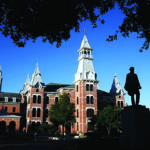Christians who debate the merits of burial versus cremation may miss a larger issue—helping people deal with the reality of death, some ministers insist.
Traditionally, Roman Catholics prohibited cremation except under special circumstances—a position Eastern Orthodox Christians retain—while Protestants favored burial but did not explicitly ban cremation.
 Brazos Bottom Baptist Church Cemetery in Snook. The church has been demolished, and only the cemetery remains.“Burial practices reflected the strong belief in the resurrection of the body,” Baptist church historian Bill Leonard said.
Brazos Bottom Baptist Church Cemetery in Snook. The church has been demolished, and only the cemetery remains.“Burial practices reflected the strong belief in the resurrection of the body,” Baptist church historian Bill Leonard said.
But those practices are changing. A recent survey by LifeWay Research revealed four out of 10 Americans plan to be cremated.
Leonard attributes the shift in practice, in part, to changes in demographics and geography.
“From the colonial period to the late 20th century, space was not an issue. There were wide open spaces that allowed for graveyards on the frontier,” he observed.
The churchyard cemetery—common to Catholic and Anglican churches—became a mainstay of Baptist, Methodist and other Protestant rural churches.
“There was a great deal of comfort in it at a time when generations lived in the same community and worshipped in the same church. You could sit in a pew on Sunday morning and look out the window, knowing it is where your family has been laid to rest, and when your time comes, you will join them. There’s a pastoral sense of sacred space,” said Leonard, the James and Marilyn Dunn Professor of Baptist Studies and professor of church history at Wake Forest University School of Divinity.
“With mobility, that had to be renegotiated. Connections to village spaces got lost.
Sign up for our weekly edition and get all our headlines in your inbox on Thursdays
 George Mason, pastor of Wilshire Baptist Church in Dallas, explains the church’s Columbarium in a church video. (Wilshire image)“As space became an issue and as environmental issues came to the forefront—and simply as a matter of practicality, especially—a lot of people gravitated to cremation.”
George Mason, pastor of Wilshire Baptist Church in Dallas, explains the church’s Columbarium in a church video. (Wilshire image)“As space became an issue and as environmental issues came to the forefront—and simply as a matter of practicality, especially—a lot of people gravitated to cremation.”
In some cultures, Christians have a strong tradition of cremation as the preferred method for the final disposition of remains, but some retained the idea of the churchyard cemetery by creating a columbarium at church, where the ashes could be deposited.
“In Japan, where I taught for a year, space was not available for burial. It was not at all unusual for a Baptist church to have a columbarium,” Leonard said.
Some Baptist congregations in the United States—such as Wilshire Baptist Church in Dallas and First Baptist Church in Greenville, S.C.—have followed suit.
Economics often factors into the choice of cremation over burial.
“Funerals have become prohibitively expensive. The funeral industry may have become, in a sense, its own worst enemy,” Leonard noted.
Among some families, ecology tilts the balance in favor of cremation.
 A woman reflects at the Wilshire Baptist Church Columbarium.“For some, it is about stewardship of land and not taking up space on the earth,” said Robert Creech, professor of Christian ministries and director of pastoral ministries at Baylor University’s Truett Theological Seminary. “They may see it as more ecologically appropriate.
A woman reflects at the Wilshire Baptist Church Columbarium.“For some, it is about stewardship of land and not taking up space on the earth,” said Robert Creech, professor of Christian ministries and director of pastoral ministries at Baylor University’s Truett Theological Seminary. “They may see it as more ecologically appropriate.
“I don’t have strong feelings one way or the other about cremation versus burial. I do think in terms of the grieving process, there is value in having the body present for the memorial service.”
The presence of a columbarium on the church grounds, like a churchyard cemetery, offers a tangible reminder of death’s reality—an element missing from some funerals in the 21st century, some ministers noted. They point to the value of a tangible reminder—whether a casket or an urn—at the funeral service.
“Having a memorial service long after the cremation of the body interrupts the process. So does another trend, having a memorial service after a private burial,” Creech said.
“Often, the word that I hear in connection with that decision is ‘convenience.’ Death is not convenient. Grief is not convenient.”
On the frontier, family members and neighbors prepared bodies for burial and placed the remains in a plain pine box, Leonard noted. Then they took turns sitting up with the dead—a tradition that continued well into the 20th century.
“When my family lived in an apartment over a funeral home in Decatur, I saw family stay in the chapel overnight, sitting up with the body,” Leonard recalled. “Catholics called it a wake. Baptists shied away from that language, and just called it ‘sittin’ up’ with the body.”
The idea of preparing a body for burial seems foreign to most modern Americans who value a “culture of convenience,” Creech noted.
“That’s contrary to the American way of death, where we pass it off to professionals, and those who are left behind are allowed to be passive observers,” Creech said.
Memorial services separated by time and space from burial or inurnment often take the form of a “celebration of life,” some ministers noted.
 James Heflin, professor of preaching and pastoral ministry at Hardin-Simmons University’s Logsdon Seminary.Christian funerals should include elements of celebration, based on belief in Christ’s victory over the grave, but they should not ignore the hard realities of death and sorrow, said James Heflin, professor of preaching and pastoral ministry at Hardin-Simmons University’s Logsdon Seminary.
James Heflin, professor of preaching and pastoral ministry at Hardin-Simmons University’s Logsdon Seminary.Christian funerals should include elements of celebration, based on belief in Christ’s victory over the grave, but they should not ignore the hard realities of death and sorrow, said James Heflin, professor of preaching and pastoral ministry at Hardin-Simmons University’s Logsdon Seminary.
“We can’t deny death or pretend grief doesn’t exist. There should be a balance between sorrow and celebration. We must deal honestly with how we will miss someone,” he said.
“There is something about the body—or even the urn, if the body has been cremated—being present. It is about escorting the loved one as far as possible—to go as far as one can go and do as much as one can do.”
Celebration of life should be balanced by acknowledgement of sorrow, he said, recalling words of advice an older pastor offered early in his ministry: “Somebody ought to be sad when somebody dies.”















We seek to connect God’s story and God’s people around the world. To learn more about God’s story, click here.
Send comments and feedback to Eric Black, our editor. For comments to be published, please specify “letter to the editor.” Maximum length for publication is 300 words.